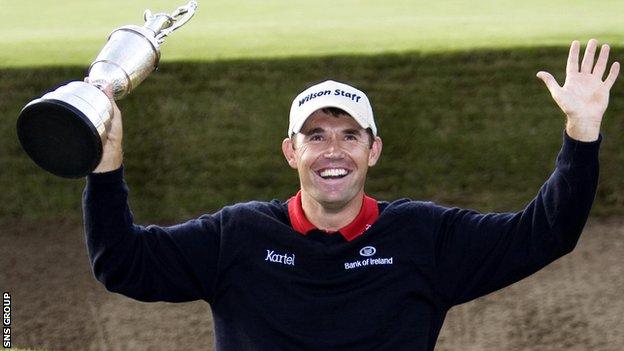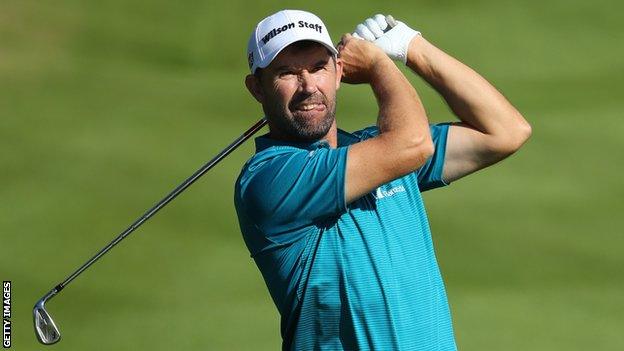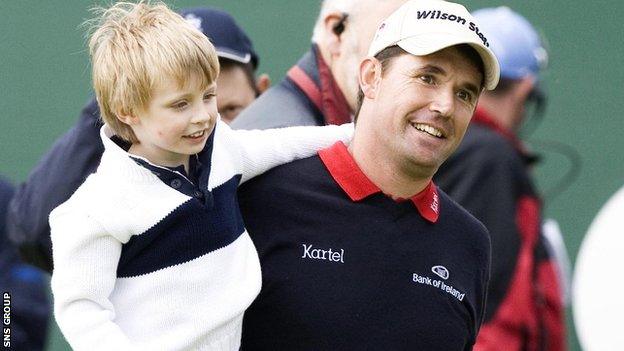Padraig Harrington on Carnoustie - The most difficult closing hole in world golf
- Published
Harrington recalls 2007 Carnoustie triumph
When Padraig Harrington talks about the storied 18th hole at Carnoustie he sounds like a man describing some of kind of medieval torture chamber, a seventh circle of hell reserved for golfers.
"Out of bounds left off the tee, water left, water right, water short, bunkers straight in front of you," he explains. "All the complications off the tee that you can possibly think of.
"The second shot, you can hit the green and go out of bounds. We've seen that many times. It's the most difficult closing hole in major championship golf and probably in world golf.
"I could play it 100 times in a row and still be as nervous and excited on the 100th attempt as I was on the first."
Harrington was back in Carnoustie on Tuesday, sizing the place up ahead of the return of The Open in July and sharing some stories of the day in 2007 when he won his first Claret Jug here in a play-off with Sergio Garcia.
What turbulence he went through that afternoon.
"It was the first time in my life that I felt embarrassed on the golf course and the first time in my life that I won a major championship," he recalls. "All sorts went on."
Catalogue of carnage at Carnoustie
If you want to present a case for Carnoustie being the most brutal test in major golf then Harrington is a key witness, but far from the only witness.
The closing stretch; that murderously difficult run from 15 through to 18, has traumatised the world's best from its first staging of The Open more than 80 years ago. Jean de Velde in 1999 is, and always will be, the poster boy for Carnoustie's destructiveness, but there are so many others.
The Open: Jean van de Velde's 18th hole disaster
In 1931, when The Open was first staged there, Carnoustie-born Mac Smith just needed to par his way in from 16 to win. Double bogey on 16 and another double on 17 ended his hopes. "I felt rather as if I had gone to see a man hanged," wrote Bernard Darwin, the doyen of golf writers of the time.
That same year, the little Argentine, Jose Jurado, took a five-shot lead into the final round but blew up. He walked off 18, retreated to a small room behind the first tee and, wrote The Scotsman, "cried like a child". He didn't speak about it for decades. Eventually, he broke his silence. "For maybe 20 years I thought about it constantly," he said. "Usually at night I'd be woken up by memories of Carnoustie."
Harrington is standing beside the 18th green and is holding his Claret Jug from 11 years ago., external He won a second a year later at Birkdale and won a third major, the USPGA, the same season.
"When somebody comes into the house and sees the Claret Jugs there's a reverence towards them," he says. "They're looking over at them and I can see they're looking and I can see they want a picture.
"It's a really nice reminder of what it means. It's one of the joys of life that people get excited about it. I had the USPGA trophy, but everybody pushes it aside to get a picture with the Claret Jug. It's amazing how iconic it is. People see it and their eyes light up."
When Harrington recounts the story of how he won in 2007 it's like being on a rollercoaster. On the Sunday, he was playing beautifully. He'd got through 15, 16 and 17 with a one-shot lead. A par down the last and Garcia would have needed to find something very special to catch him.
'I got a moment of doubt on the top of my backswing'

Harrington was the first Irishman to win The Open in 60 years back in 2007
"When I'm confident I sometimes jump up on the tee thinking I'm bulletproof - and I was feeling bulletproof that day," he says.
"I was going to bust it down the middle. Everything was great. I got a moment of doubt on the top of my backswing, only a small amount of doubt but it felt extreme because I wasn't expecting it.
"If I was standing on the tee with a little more fear, I would have been ready for the self doubt and I would have handled it. I hit a terrible drive."
Into the Barry Burn he went. He had 238 yards to the green. A 4-iron. "Extraordinarily difficult. Wind off the right and all the danger that I talked about earlier," he says. "I was just trying to carry the Barry Burn and let it run up to the front of the green. I hit another bad shot - and I was devastated.
"The tee shot was bad, but, hey, you get on with it. Plenty of people hit bad tee shots on 18 at Carnoustie. The second shot was me throwing away The Open.
"In that moment I was sure I'd just lost my chance. It was my Open. I was one ahead, I was playing great, it was mine to lose and I felt like I'd lost it.
"It was one of the few times in my whole career that I felt like I'd choked. I would have been happy for the ground to open up and swallow me. I was going to throw in the towel."
Enter Ronan Flood, Harrington's friend and caddie. On the walk to the burn Flood hit Harrington with positivity. 'It's not over'. 'One shot at a time'. 'Let's finish this out'.

US-based Harrington, 46, is currently ranked at 214 in the world
"Every cliche under the sun," he remembers. "I think he took the 4-iron off me because I would have hit him with it. He was resilient, though. Other caddies might have moped and shown their devastation. He must have felt terrible as well, but he didn't let on.
"I can say, categorically, that in those moments he won me The Open championship. By the time we got to the burn I was listening to him and I was back in the zone.
"I had a chip shot of 49 yards to the pin and I hit it like a teenager showing off, a low, hard, spinny one. The whole crowd thought I'd mis-hit it and knifed it over the back of the green but in my head I was saying, 'Watch the spin on this'.
"That chip was purity. The putt, a six-footer, was the opposite, it was a grind, a nasty one. I just willed it in. When I holed it for a double-bogey it hit me again that I'd just lost The Open."
'I stopped feeling like I was a loser'
Then came his sliding doors moment. Young Paddy Harrington, aged three-and-a-half, was standing at the back of the green with his mum, Caroline. She had him on a tight rein until the putt dropped. Then he made a run for it. Everything changed there and then.
"As I walked off the green I saw him running on," says Harrington. "I picked him up, gave him a bit of a twirl and at that moment in time I stopped feeling like I was a loser. There's your son and when he looks at you he's not judging you. It definitely helped change my mindset. Somebody still loves me.
"It was a huge change in my momentum. It was just the way he looked at me, or the way I felt he looked at me. It brought me back to where I needed to be. I wanted to be miserable, but he wasn't having any of it."

Harrington shares a moment with son Paddy after holing out for a double-bogey at the 18th
Harrington remembers retreating to the recorders' hut to watch Garcia play 18. The Spaniard had an 8ft putt to win The Open.
"I wasn't sitting there going 'Miss, miss, miss' and when he did miss I never got a change of emotion from it. I was sitting there thinking, 'I am going to win this Open'.
"Now, logically, he had to miss for me to have a chance of winning it, but I'd convinced myself that I was going to win, I didn't go out for the play-off thinking, 'Amn't I lucky to be in a play off, happy days'. It's amazing how badly people approach play-offs. I was on an even keel. Business as usual, 'I am going to win this somehow'."
'There's a lot of things that might have been different'
Over the years he's been asked what might have happened had Garcia's putt dropped instead of missing by a millimetre.
"People ask if it was life-changing to win, because I managed to win two more majors on top of it," he says. "I don't know about that, but I think losing might have been career-changing. If I'd lost it could have put me into reverse. It would have been a big loss, a hard one to take.
"The drive I hit on the 72nd hole has damaged my driving ever since. Can you imagine if it resulted in me losing the tournament? There's a lot of things that might have been different that we will never know about."
Eighty-seven years ago, Edinburgh's Tommy Armour won The Open at Carnoustie. "I've never lived through such an hour," he said in the aftermath of the mayhem that unfolded. Harrington, more than most, would have known what he was talking about.
Playing 18 again on Tuesday morning, this time just for fun, he smashed a perfect drive down the middle, avoiding the bunkers and the burn and the out of bounds.
"Now if only I'd done that 11 years ago I'd have saved myself an awful lot of grief," he jokes. Leaving the tee box he smiled the smile of a survivor - and a champion.